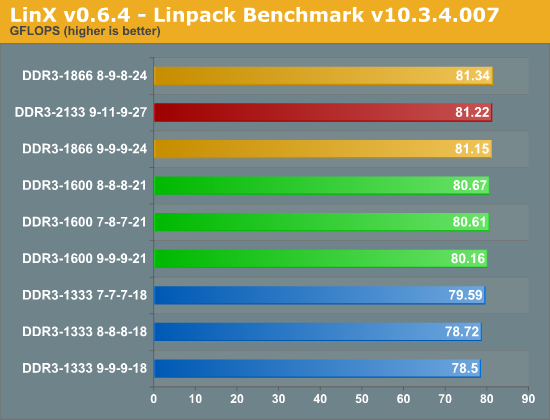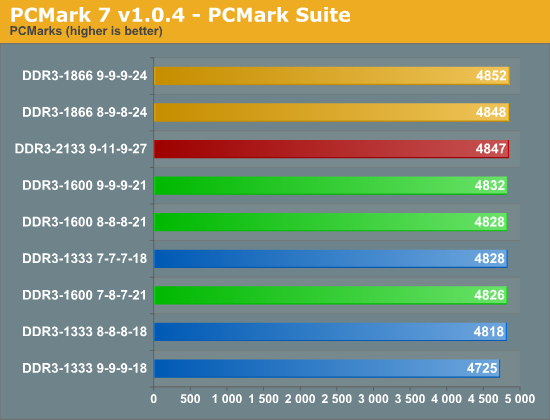Sandy Bridge Memory Scaling: Choosing the Best DDR3
by Jared Bell on July 25, 2011 1:55 AM ESTLINPACK Benchmark
At first I wasn't going to include the results of the LINPACK benchmark, but I figured there's no reason for them to go to waste as they were used for stability testing. The LINPACK benchmark is a measurement of a system's floating-point computing power. Today, it's widely used by enthusiasts for testing the stability of their overclocked systems. The later versions of LINPACK include support for Intel's AVX instruction set, which stress the CPU and RAM even more than before. We'll be using a front end to the LINPACK benchmark called LinX.

Now we begin to see how that extra ~36% of bandwidth really affects system performance. As you can see, there's not exactly a ~36% advantage in LINPACK from the fastest to the slowest. Here, we're barely seeing a ~3% advantage for the faster memory. Once we get to DDR3-1600, there's not much of a difference at all.
PCMark 7
We'll measure overall system performance using the PCMark suite. This will perform a broad range of tests including video playback, video transcoding (downscaling), system storage (gaming), graphics (DX9), image manipulation, system storage (importing pictures), web browsing, data decrypting, and system storage (Windows Defender).

If you take a step back and look at performance from an overall perspective, you can see that faster memory doesn't really have much of an effect. Every speed tested shows a ~2% performance increase over the slowest memory. Outside of CAS 9 DDR3-1333, then, you can pretty much use any DDR3 memory and get close to optimal performance in general applications.










76 Comments
View All Comments
Rajinder Gill - Friday, July 29, 2011 - link
LOL!Caught with your pants down there sir.
Isaac the k - Tuesday, August 2, 2011 - link
Memory above DDR3-1333 is plentiful and cheap.Sandy Bridge benefits from the bump up to 1600.
Mobo's all can handle the higher spec'ed memory.
WHY IS INTEL SPEC'ING THE NEW I7's FOR 1333 INSTEAD OF 1600 BY DEFAULT?
I don't want to have to futz with my BIOS just to get my memory to run at STOCK timings!
Why the HELL are they crippling the basic utility of their chips??
I grant you, it isn't a major increase in performance, but why set the ceiling so low? why not set it higher and let the mobo manufacturers choose what their boards are compatible with???
shriganesh - Wednesday, August 24, 2011 - link
This article is thoughtful and very good news for mid-end to high-end system builders :)There's absolutely no need to pay extra for those faster and better memory modules!!
ryedizzel - Tuesday, September 20, 2011 - link
Thank you very much for this article. I have been memory shopping for a couple days now and debating on different memory speeds vs. latency vs. price. I wish I had the lab setup to test them all. Thanks again!James D - Monday, November 28, 2011 - link
On each speed type (1333, 1600, 1866 etc.) you used only slightly different timings! For example for speed 1333 Mhz you had:1) 7-7-7-18
2) 8-8-8-18
3) 9-9-9-18
In this case of course you won't get much different results! Don't you know that changing CL and other timings you can change tRAS timings which is the minimum number of clock cycles needed to access a certain row of data in RAM between the data request and the precharge command.
OF COURSE you won't get big difference if you didn't change tRAS! If you lower all other timings then most likely you can decrease tRAS which also will increase performance.
Please rebench all these with slightly different all types of timings. It means a lot for results.
poohbear - Saturday, December 17, 2011 - link
Thanks for running the gaming benchmarks @ 1920x1080 to show us practical results (ie there were none!). i hate it when they run these benchmarks @ 800x600 or some nonsensical low resolution to show us a difference that we really could care less about in 2011.